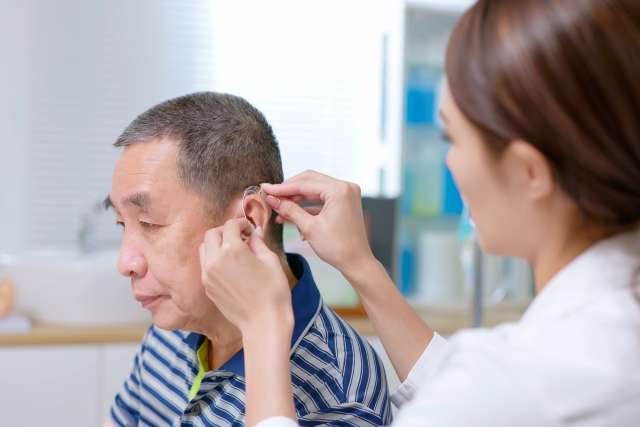Hearing loss is an issue that often goes untreated. More than 35 million adults in the United States have trouble hearing. But of the 28 million adults who could benefit from hearing aids, only 16% of adults ages 20 to 69 and 30% of adults 70 and older have ever used them.
If you have hearing loss and don’t use a hearing aid, you may want to reconsider.
Researchers continue to uncover evidence that hearing loss is a risk factor for dementia (severe mental decline). But they’ve also discovered that the likelihood of developing dementia is lower for people wearing hearing aids.
What’s the connection between hearing loss and dementia?
Hearing loss affects you physically, mentally and emotionally. It can increase your risk of:
- Cardiovascular disease
- Depression
- Falling
- Hospitalization
Hearing loss also directly impacts your brain and cognition (the ability to learn and understand), increasing the risk of dementia. When you struggle to hear, it can cause your brain to:
1. Work harder
When you can’t hear well, you may need to fill gaps. Your brain will be working overtime to piece together what you see around you and the limited amount you hear to figure out what you aren’t hearing. When your brain is straining regularly, it can impact memory and your ability to think.
2. Shrink or atrophy
Your brain gets smaller with age. But research shows that hearing loss causes the brain to atrophy (deteriorate) faster, interfering with brain function. Dementia is just one symptom of brain atrophy. Other symptoms include:
- Difficulty communicating
- Memory loss
- Seizures
- Vision issues
3. Avoid stimulation
Hearing loss can make socializing less enjoyable since it’s often harder to hear in noisy spaces such as parties, sporting events, and restaurants. Research shows that older people with hearing loss are 37% more likely to limit social engagement. Without socialization, your brain may struggle to be engaged or intellectually stimulated.
How to test for hearing loss
Signs that you might have hearing loss include:
- Asking people to repeat themselves often
- Difficulty understanding or hearing people in restaurants or other noisy environments
- Needing to turn up the volume on the TV or your phone
- Ringing sounds in your ears
If you have any of those symptoms, you’ll want to get a hearing test, which can be performed by a primary care physician (PCP), audiologist (hearing loss specialist) or otolaryngologist (ear, nose and throat specialist). Hearing tests see how you respond to sounds and words of varying pitches and volumes. Some of the tones may be mixed with background noise.
Types of hearing tests
A hearing evaluation tests many aspects of your hearing. Your testing may include:
- Acoustic reflex measures, also called middle ear reflex (MEMR), test your response to loud sounds.
- Pure-tone tests, or audiometry, look for the quietest tones you can hear at different pitches.
- Speech and word recognition tests check to see if you can hear spoken words.
- Tuning fork tests identify what type of hearing loss you have, and which ears it affects.
- Tympanometry tests check to see if you have any medical issues in your ears such as fluid buildup, infection or an eardrum tear.
Types of hearing loss
Your testing may show that you have one of three types of hearing loss:
- Conductive hearing loss is temporary and treatable, caused by a blockage in your ear such as from fluid or infection.
- Sensorineural hearing loss, or nerve deafness, can range from mild to severe and results from a problem with your ear’s structure or nerves.
- Mixed hearing loss means you have both conductive and sensorineural hearing loss.
How hearing aids help
Depending on the type and severity of your hearing loss, hearing aids may help. Hearing aids amplify sounds (make them louder). They can also help get those sounds to your inner ear, which converts sound to signals that travel to the brain.
Unfortunately, hearing aids don’t work like eyeglasses — they cannot fully restore hearing. But they do make a difference. They can help you hear sounds you might have previously missed, and what you hear may sound clearer.
There are two ways that hearing aids can work:
- Air conduction aids use air to push the louder sound from the ear canal to the inner ear.
- Bone conduction aids amplify sound and send it through the skull to the inner ear, which is helpful if you have problems in your outer or middle ear.
Different types of hearing aids
People with hearing loss often choose not to wear hearing aids because of how they look or feel. But with so many kinds of hearing aids available, it shouldn’t be hard to find one that works for you.
Styles of hearing aids include:
- Behind-the-ear (BTE): A large plastic case houses all the electronics and sits behind your ear. It’s connected to a small earmold that fits into your ear canal.
- Receiver-in-the-canal (RIC): These hearing aids are smaller than BTE aids but also sit behind the ear. It’s attached to a wire with a small dome-shaped tip that sits inside your ear canal.
- In-the-ear (ITE): A custom-fit shell containing all the electronics sits in the outer ear.
- In-the-canal (ITC): These tiny hearing aids fit partly or entirely in the ear canal — all the electronics fit in the small, custom-fit shell.
For optimal comfort and hearing, have your aids fitted by a hearing specialist or audiologist. If you are considering over-the-counter hearing aids, be aware that they are available with differing levels of customization.
Questions to ask before buying a hearing aid
Before you purchase a hearing aid, the National Institute on Deafness and Other Communication Disorders recommends asking about:
- Cost: What is the total cost? Are more expensive hearing aids (with more bells and whistles) worth it?
- Features: What features are available? Which features are most important to me?
- Return policy: Is there a trial period for the hearing aids? What is the refund or return policy?
- Repairs: Is there a warranty? What does the warranty cover, and how long does it last? Who will make repairs to the hearing aids? Will loaner aids be available?



